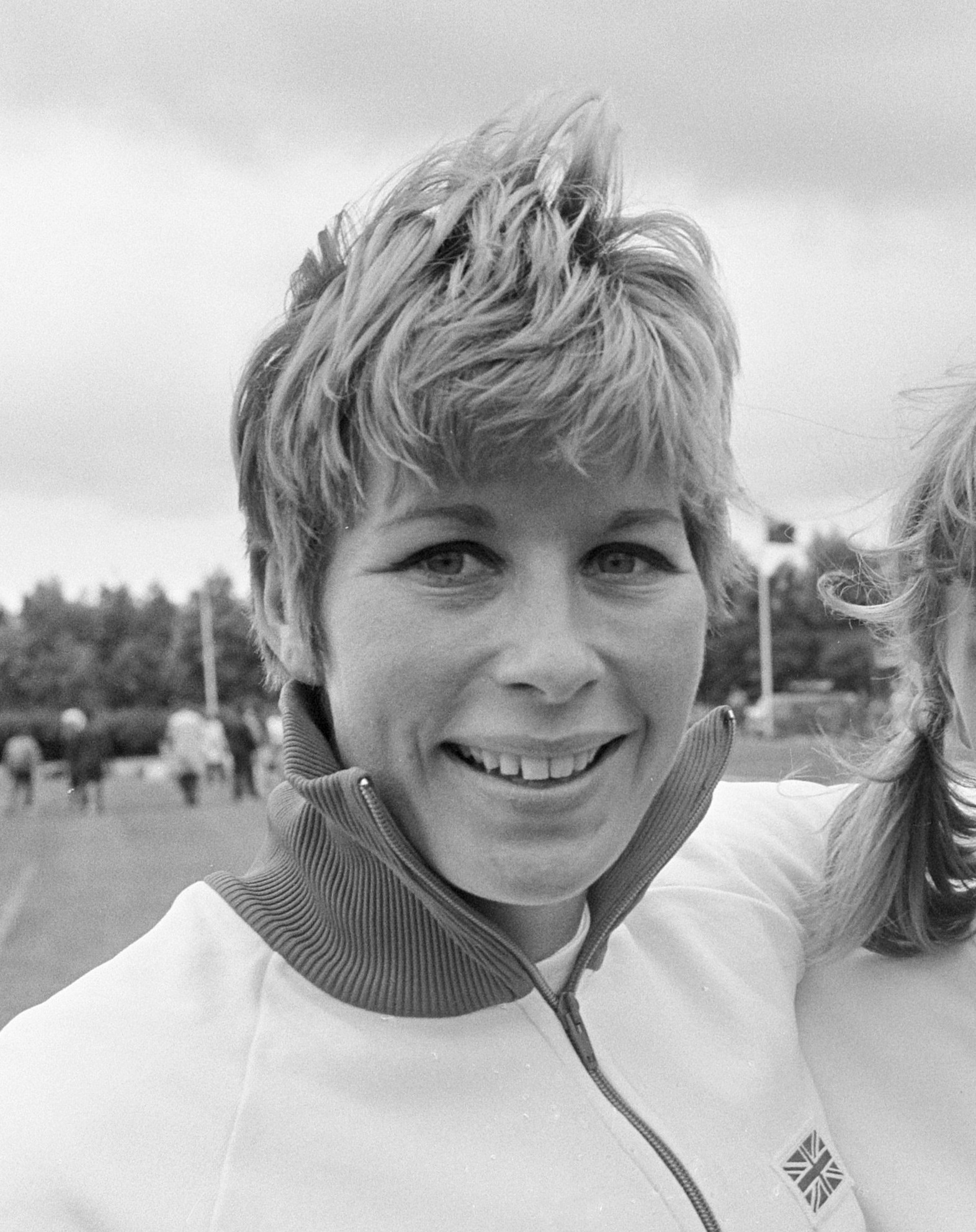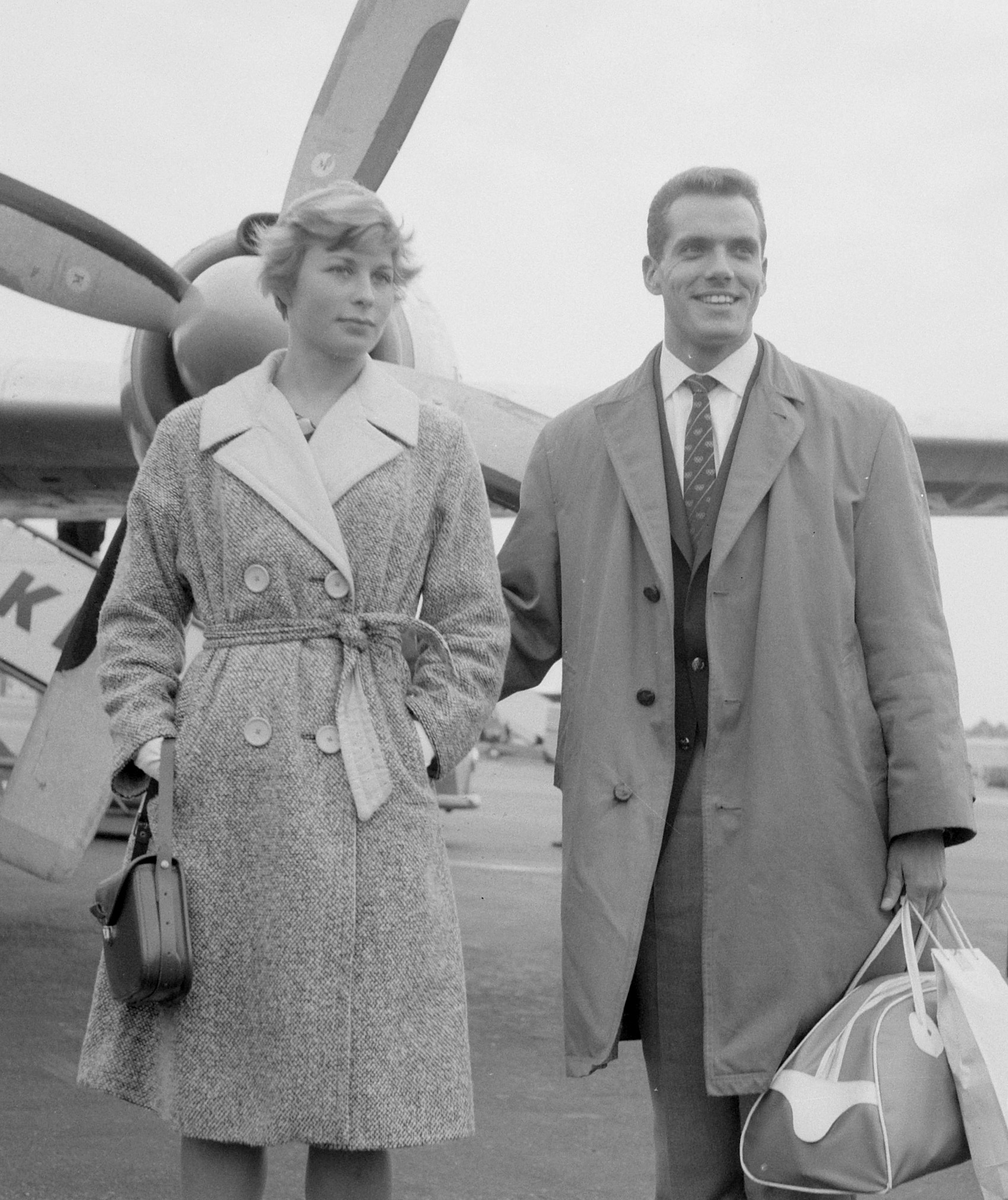1. Life
Mary Rand's early life and the commencement of her athletic career laid the foundation for her later groundbreaking achievements in track and field.
1.1. Early life and upbringing
Mary Denise Bignal was born on 10 February 1940, in Wells, Somerset, England, where she also grew up. She is the daughter of Eric and Hilda Bignal. Demonstrating exceptional athletic talent from a young age, she was offered an athletics scholarship to Millfield School at the age of 16. During her time there, she excelled in all sports and earned multiple All-England Schools' titles. Her particular strengths were evident in the high jump, long jump, and hurdles. In 1956, she was invited as a guest to a training camp for the Olympic squad in Brighton, where she notably outperformed Britain's top high jumpers, signaling her immense potential.
1.2. Early career
Rand's competitive career began with significant impact. At the age of 17, she set a British record in the pentathlon, achieving a score of 4,046 points. Her early international appearances included the 1958 British Empire and Commonwealth Games in Cardiff, where she secured a silver medal in the long jump and finished fifth in the high jump. Just one month later, she competed in the European pentathlon championship, placing seventh.
2. Athletics career

Mary Rand's athletics career was marked by consistent high-level performance and culminated in a historic showing at the 1964 Tokyo Olympics, along with other significant international and national achievements.
2.1. 1960 Rome Olympics
Rand participated in the 1960 Summer Olympics held in Rome. In the qualifying round of the long jump, she set a new British record with a leap of 21 ft (6.33 m). This performance suggested strong medal potential, as repeating such a jump in the final would have earned her a silver medal. However, in the long jump final, she committed fouls on two of her three attempts, ultimately finishing in ninth place. She also competed in the 80m hurdles, where she narrowly missed a medal, placing fourth.
2.2. 1964 Tokyo Olympics
The 1964 Summer Olympics in Tokyo represented the pinnacle of Mary Rand's career, where she achieved unprecedented success for a British female athlete. In the long jump qualifying rounds, she immediately made her mark by setting an Olympic record with a jump of 21 ft (6.52 m). In the final, she faced strong competition from favorites such as the world record holder Tatyana Shchelkanova of the Soviet Union and Poland's Irena Kirszenstein. Her very first jump of 22 ft (6.59 m) established a new British record. In the fifth round, despite a wet runway and a headwind of 3.6 mph (1.6 m/s), Rand delivered a monumental leap of 22 ft (6.76 m), which not only secured her the gold medal but also broke the existing world record. This world record stood for four years until it was surpassed by Viorica Viscopoleanu at altitude during the 1968 Mexico City Olympics.
Beyond her gold in the long jump, Rand continued her impressive medal haul at the Tokyo Games. She earned a silver medal in the pentathlon, accumulating 5,035 points, placing her second in the all-time rankings at that point. She was surpassed for the gold medal by Irina Press, whose biological sex has been the subject of speculation. Additionally, Rand contributed to the British team's success by winning a bronze medal as a member of the 4x100 metres relay squad. Her achievement of winning three medals in a single Olympic Games made her the first British woman to do so, a record that remained unbroken until Emma Finucane's performance in 2024. Her roommate, Ann Packer, who won the 800 metres six days after Rand's gold, famously remarked, "Mary was the most gifted athlete I ever saw. She was as good as athletes get, there has never been anything like her since. And I don't believe there ever will."
2.3. Commonwealth Games
Mary Rand had a notable presence at the Commonwealth Games throughout her career. At the 1958 British Empire and Commonwealth Games in Cardiff, she earned a silver medal in the long jump. Eight years later, at the 1966 British Empire and Commonwealth Games in Kingston, she achieved a gold medal in the long jump, further solidifying her dominance in the event.
2.4. Other competitions and records
Rand's impressive career extended beyond the Olympic and Commonwealth Games. At the 1962 European Athletics Championships in Belgrade, she secured two bronze medals: one in the long jump and another as part of the 4x100m relay team.
She held an unofficial world record in the triple jump from 1959 to 1981. This record was not officially recognized by the International Association of Athletics Federations (IAAF) as a world record until 1990, when the women's triple jump became an officially recognized event.
Domestically, Rand was a prolific winner of national titles, securing 12 WAAA Championships throughout her career. These included six long jump titles (in 1959, 1961, and annually from 1963 to 1966), two high jump titles (1958 and 1959), two sprint hurdles titles (1959 and 1966), and two pentathlon titles (1959 and 1960).
After her triumph in Tokyo, her training became less intensive. She was unable to qualify for the 1968 British Olympic team due to injury and subsequently retired from competitive athletics in September of that year.
2.5. Major International Results
| Year | Competition | Location | Event | Result | Mark |
|---|---|---|---|---|---|
| 1958 | Commonwealth Games | Cardiff (Wales) | Long jump | Silver | 20 ft (5.97 m) |
| 1962 | European Championships | Belgrade (Yugoslavia) | Long jump | Bronze | 20 ft (6.22 m) |
| 1962 | European Championships | Belgrade (Yugoslavia) | 4×100m relay | Bronze | 44.9 s |
| 1964 | Olympic Games | Tokyo (Japan) | Long jump | Gold | 22 ft (6.76 m) |
| 1964 | Olympic Games | Tokyo (Japan) | Pentathlon | Silver | 5035 points |
| 1964 | Olympic Games | Tokyo (Japan) | 4×100m relay | Bronze | 44.0 s |
| 1966 | Commonwealth Games | Kingston (Jamaica) | Long jump | Gold | 21 ft (6.36 m) |
3. Personal life

Mary Rand's personal life saw several significant changes. Around 1960, she was in a relationship with Dutch decathlete Eef Kamerbeek. In 1961, she met rower Sidney Rand. Their relationship progressed rapidly; she agreed to marry him just three days after their first meeting, and they were married five weeks later. This marriage lasted five years, during which they had a daughter named Alison.
In December 1969, she married her second husband, American decathlon champion Bill Toomey, who had won gold at the 1968 Olympics. Their marriage spanned 22 years, and they had two daughters together, Samantha and Sarah. Following this marriage, she later married John Reese and currently resides with him in Atascadero, California, in the United States. Mary Rand holds dual UK and US citizenship.
4. Awards and honors
Mary Rand received numerous accolades and recognitions throughout and after her illustrious career, reflecting her significant contributions to athletics. For her services to athletics, she was appointed a Member of the Order of the British Empire (MBE) in the 1965 New Year Honours. In 1964, the same year as her Olympic triumphs, she was voted BBC Sports Personality of the Year, a testament to her popularity and the impact of her achievements.
In 2009, her enduring legacy was further recognized with her induction into the England Athletics Hall of Fame. On 26 January 2012, her hometown of Wells awarded her the Freedom of the City, following a campaign initiated by local resident Tony Williams. A plaque commemorating her world record long jump of 22 ft (6.76 m) at the 1964 Olympic Games is located in the Market Place in Wells, with the exact distance marked out by a row of Olympic rings set into the pavement. Rand was succeeded as the "Golden Girl of British athletics" by her friend and London Olympiades club-mate, Lillian Board.
5. Retirement and impact
Mary Rand's competitive athletics career concluded in September 1968, primarily due to injuries that prevented her from making the British Olympic team for the 1968 Mexico City Games. Despite her retirement, her influence on British athletics, particularly women's sports, has been profound and enduring. She is widely regarded as a pioneer in her field, having broken barriers and achieved unprecedented success for British female athletes. Her historic gold medal and multiple medals at the 1964 Tokyo Olympics established her as a powerful role model. Rand's achievements continue to serve as an inspiration for subsequent generations of British female athletes, demonstrating the heights that can be reached through talent, dedication, and perseverance.
6. Assessment
Mary Rand stands as one of Great Britain's most iconic and influential track and field athletes. Her career, highlighted by her groundbreaking performance at the 1964 Tokyo Olympics, fundamentally shifted perceptions of what British women could achieve in elite sports. By becoming the first British female to win an Olympic track and field gold and the first to secure three medals at a single Games, she not only etched her name in the record books but also inspired a nation. Her ability to perform under pressure, setting a world record in the long jump final, showcased exceptional mental fortitude and athletic prowess. Beyond her medals and records, Rand's legacy is defined by her role as a trailblazer who paved the way for future generations of female athletes, contributing significantly to the growth and recognition of women's athletics in Great Britain. Her status as a national sporting icon remains firmly established, reflecting her immense contributions to the sport and her lasting impact on British sporting history.